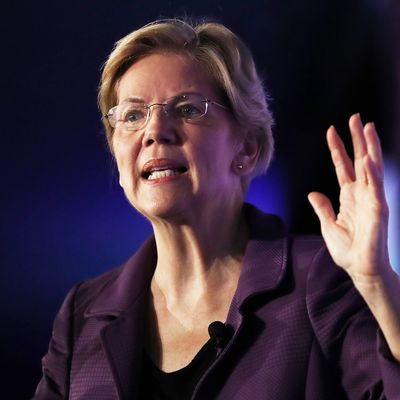
The recent, steady rise of Elizabeth Warren’s presidential candidacy has obviously changed the dynamics of the 2020 Democratic nomination contest. While her strong favorability rating among Democrats has unsurprisingly paralleled her enhanced levels of support as a first-choice candidate, nagging doubts remain about her “electability” — despite the fact that she is routinely leading Trump in general-election trial-heat polls. Some of it undoubtedly flows from the unproven but widespread belief that Americans (usually other Americans, not poll respondents themselves) “aren’t ready” for a woman as president. There are also various concerns arising from Warren’s standing in her home state of Massachusetts — or even from the identity of her home state, which produced presidential-general-election losers in 1988, 2004, and 2012. Some observers even think the vastly overblown “scandal” over Warren once identifying in an academic directory as Native American — the source of the endless Trumpian “Pocahontas” taunt — is a much bigger deal than any rational assessment would suggest.
But the problem with Warren that we are beginning to hear about most frequently is the claim that she’s just “too liberal” or “too far left” for otherwise persuadable voters (or donors) to countenance. Thus, in theory, she will lose swing voters that, say, Joe Biden might win, in part because her anti-corporate rhetoric and progressive policy positions will play into the Trump campaign’s clearly planned message that Democrats are all godless, baby-killing, America-hating socialists.
Where is this argument coming from, if Warren is leading Trump in trial heats and becoming steadily more popular? Pretty clearly, corporate voices from Wall Street to Silicon Valley are taking the lead in demonizing her, for good reason: She’s a threat to their bottom lines and their all-but-sovereign business practices. As The Wall Street Journal recently reported, the drumbeat of warnings about Warren is getting louder, and emanates from separate sectors prone to different ideological tendencies. That became clear when leaked audio revealed Mark Zuckerberg’s fears about the candidate who has called for breaking up Facebook:
Mr. Zuckerberg and his peers running Silicon Valley’s megafirms aren’t the only executives feeling a bit uneasy about a White House potentially occupied by Ms. Warren …
Multiple polls indicate Ms. Warren’s campaign is gaining traction, and that momentum has wealthy donors warning the Democratic party her nomination would prompt them to leave their wallets in their pockets. Many of those wallets belong to company owners, influential shareholders, top executives and board members.
Ed Mills, Washington policy analyst for Raymond James Financial Inc., told me this week the changing dynamics in the election was a dominant topic in recent days. “I had many more conversations about Elizabeth Warren in the last week than I did about impeachment.”
And the emerging claim is that the very act of electing Warren could be a calamity:
Lori Calvasina, RBC Capital Markets’s head of U.S. equities strategy, said recent jitters in the stock market indicate investors are showing concern about a Warren presidency and its potential impact on markets. “People are starting to wake up to the risk” she said. As shareholders — including major institutional investors — express concern, top executives will be pressed to demonstrate they aren’t asleep at the wheel.
There are even not-so-veiled threats from investor types that they will tank the economy if voters insult them by electing Warren:
At the Delivering Alpha conference this week, [Omega Advisors CEO Leon] Cooperman sounded the alarm about a Warren win by saying “There’s unquestionably a shift to the left in this country,” and adding “They won’t open the stock market if Elizabeth Warren is the next president.”
[I]n a later CNBC interview, he revised his panic down only slightly, predicting that a Warren presidency would result in a catastrophic drop in the stock market.
In a parallel development to the prospective revolt of the capitalists against Warren, those purporting to represent the #NeverTrump faction of alienated Republicans are beginning to let it be known that their willingness to support a Democrat in order to defenestrate President Trump and take back their party is strictly conditional on the ideology of the nominee, with Warren being beyond the pale. David Drucker reported on this phenomenon last week:
Prominent Never Trump Republicans insist they would never back rising Democratic contender Elizabeth Warren, describing an election that pits the liberal Massachusetts senator against a president they despise as a choice between two unacceptable options.
A few Republicans opposed to Trump are prepared to support Warren if she emerges as the only viable challenger, affirming a commitment to topple the president at all costs. But for many well-known Republicans and unaligned political operatives inside the community of conservative Trump opponents, there are limits. Joe Biden, the former vice president, is a traditional labor Democrat they can stomach and even promote for. Warren is another matter, at least as they see things now …
“There is no universe where I will ever vote for Donald Trump and there is no universe where I could ever vote for Elizabeth Warren,” said Jennifer Horn, former chairman of the New Hampshire Republican Party. “If Democrats really care about mending our nation, they shouldn’t be looking at the most far-Left people.”
Some #NeverTrump types are orthodox business conservatives who deplore Trumpian “populism,” and want a safe-and-sound non-populist Democrat who will return the political system to the pre-Trump status quo ante, which happens to be the basic rationale of Joe Biden’s candidacy.
So taken together, a powerful elite coalition of non-Democrats and at best quasi-Democrats is telling Democrats they cannot choose Warren because if that happens they will (a) destroy the economy and/or (b) throw the election to Trump.
The thing to watch going forward is whether Warren’s Democratic rivals begin to explicitly refer to these concerns as reasons not to nominate her, and tie their individual campaigns to an Anybody-But-Warren campaign. The fear that Warren’s (and Bernie Sanders’s) policy positions are not in line with the views of the general electorate is hardly a new one, as my colleague Jonathan Chait observed last month:
[S]he has spent most of the last year positioning herself as if the general election will never happen. At the moment, I’d feel very nervous betting the future of American democracy on Warren’s ability to defeat Trump.
The question is how Democrats measure the risk associated with a Warren nomination. There are objective measurements, including polling and sober analysis of how the 2020 general election is developing. And then there are protestations by business elites and their friends that purport to represent public opinion but seem more than a tad self-interested. Elizabeth Warren is going to point that out early and often, as one investment adviser noted:
“The more that folks in power come out against Warren, the more power she gets,” [Ed] Mills [of Raymond James Financial, Inc.] said. “When Wall Street mega donors say ‘anybody but her,’ that’s free advertising.”
These birds are smart enough to try to throw their voices like ventriloquists and claim that regular folks share their fears about Warren and “populism.” So there could be a lot of shadowboxing if and when Warren emerges as the Democratic front-runner.






























